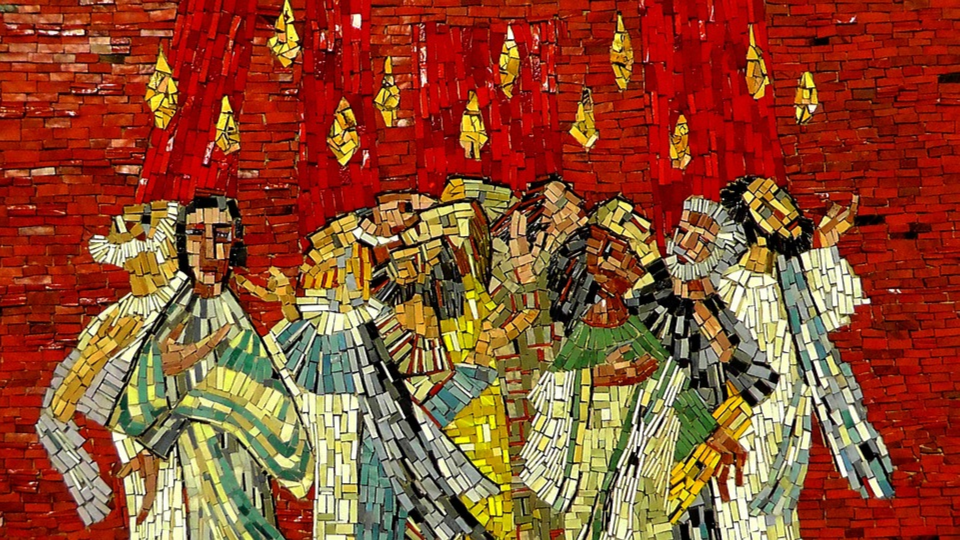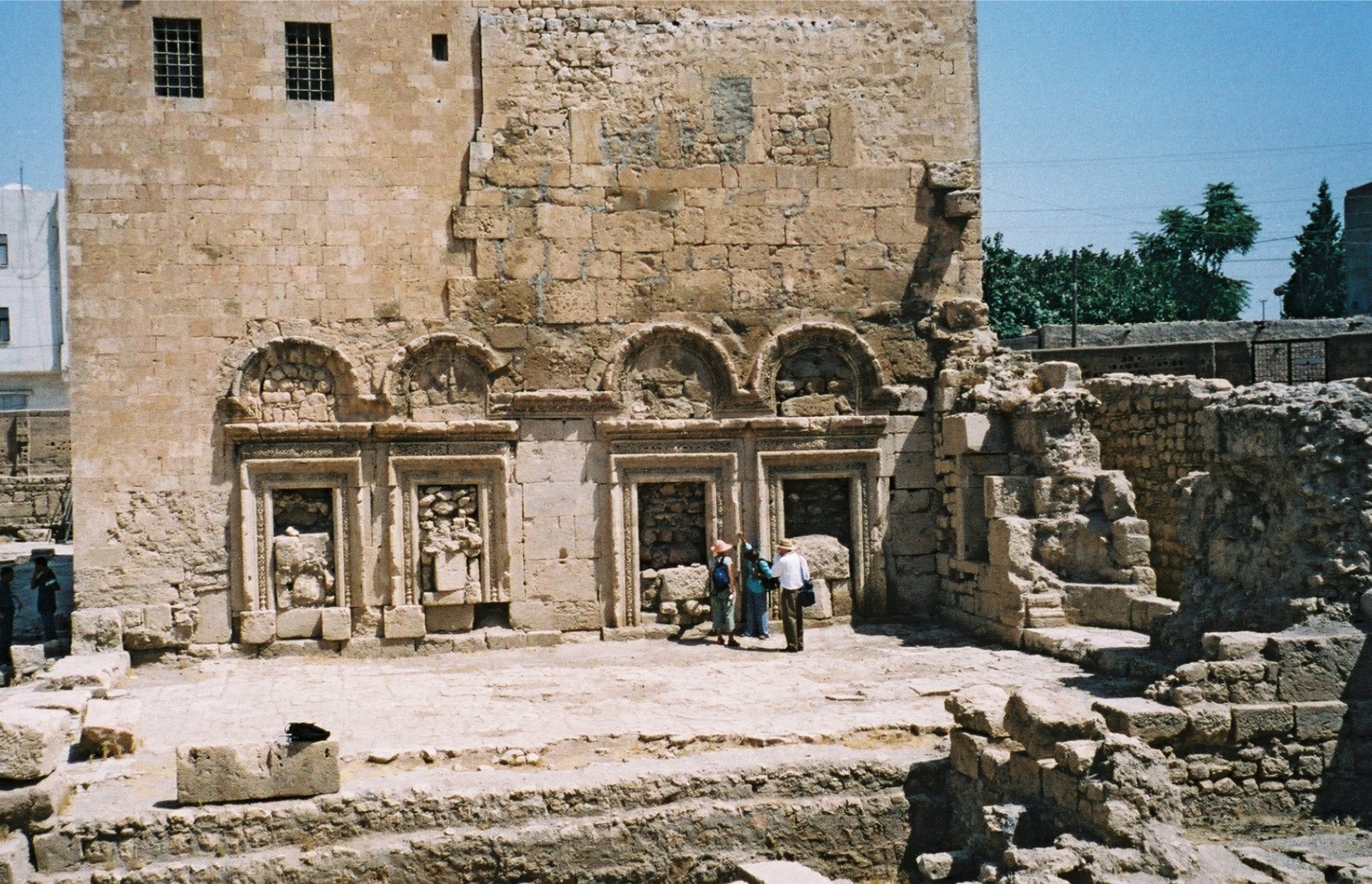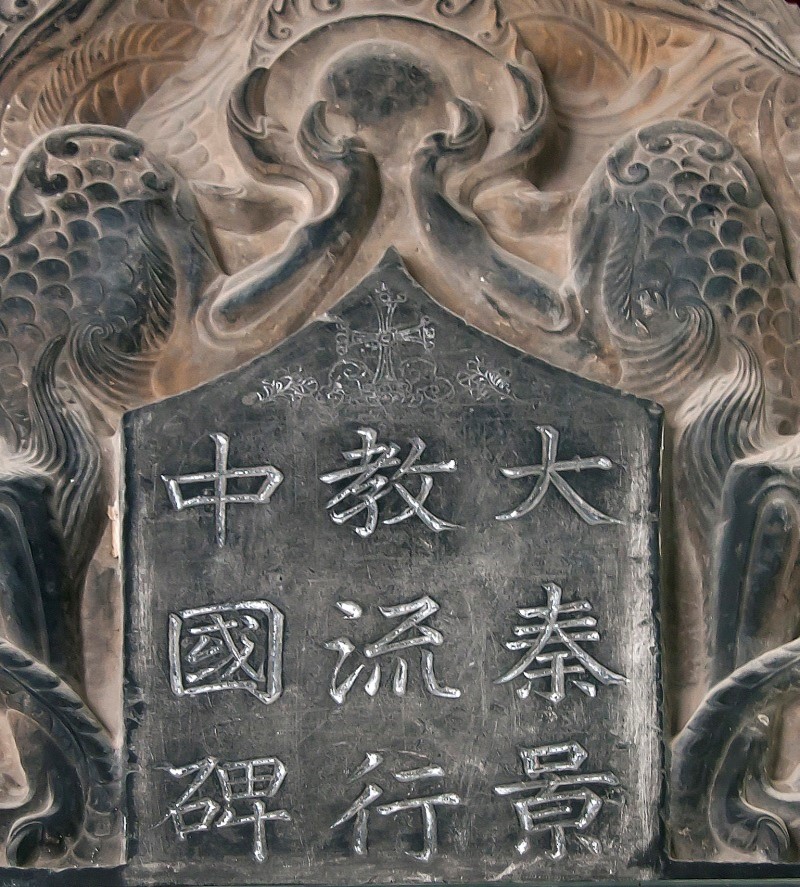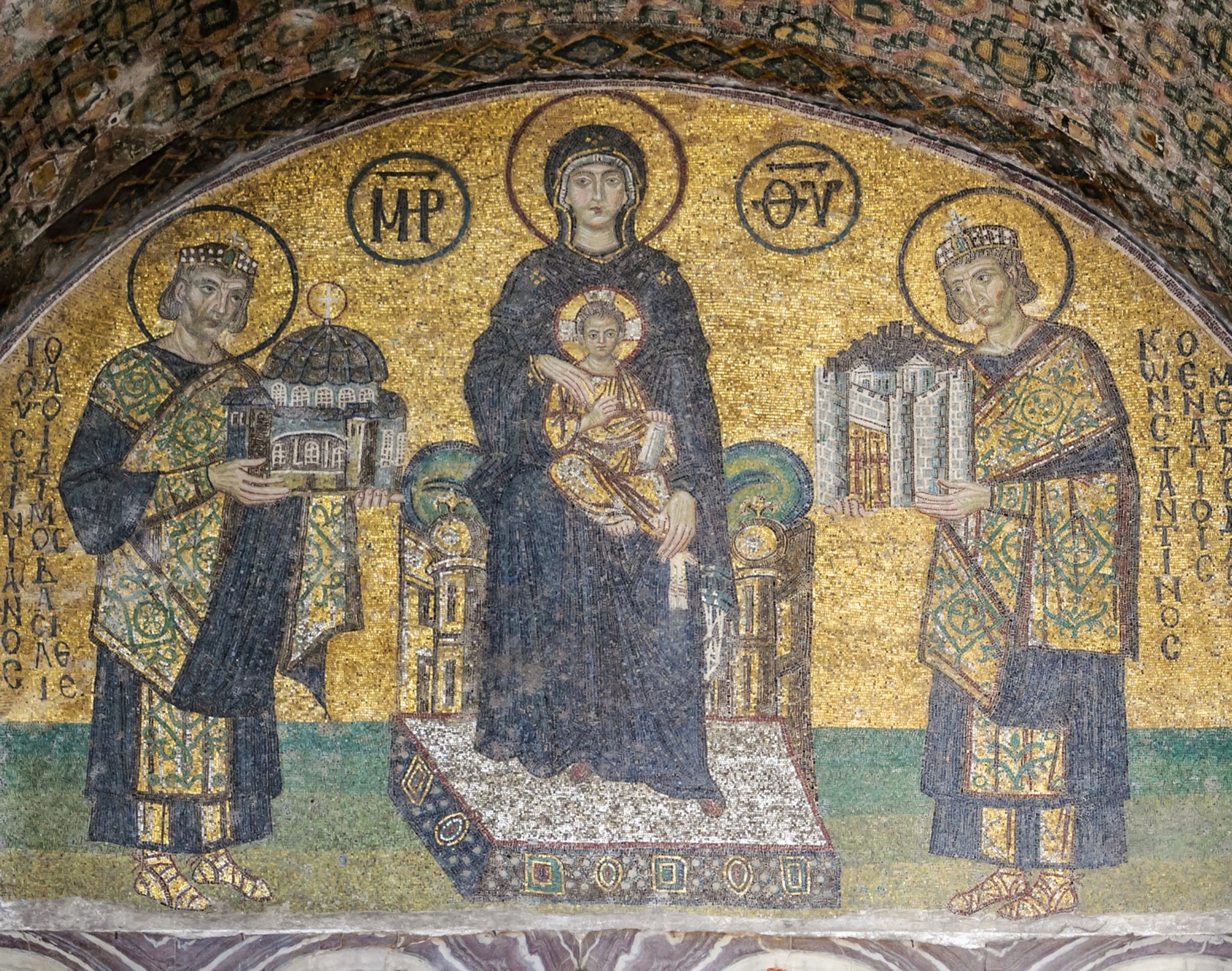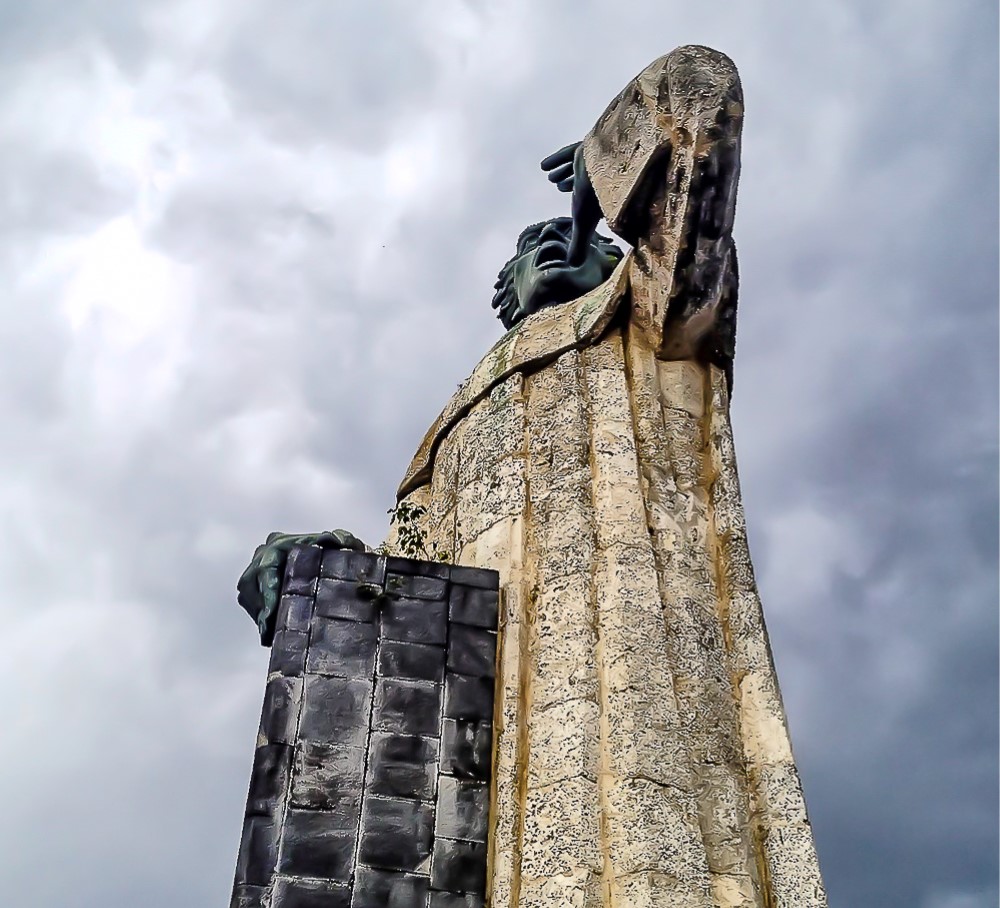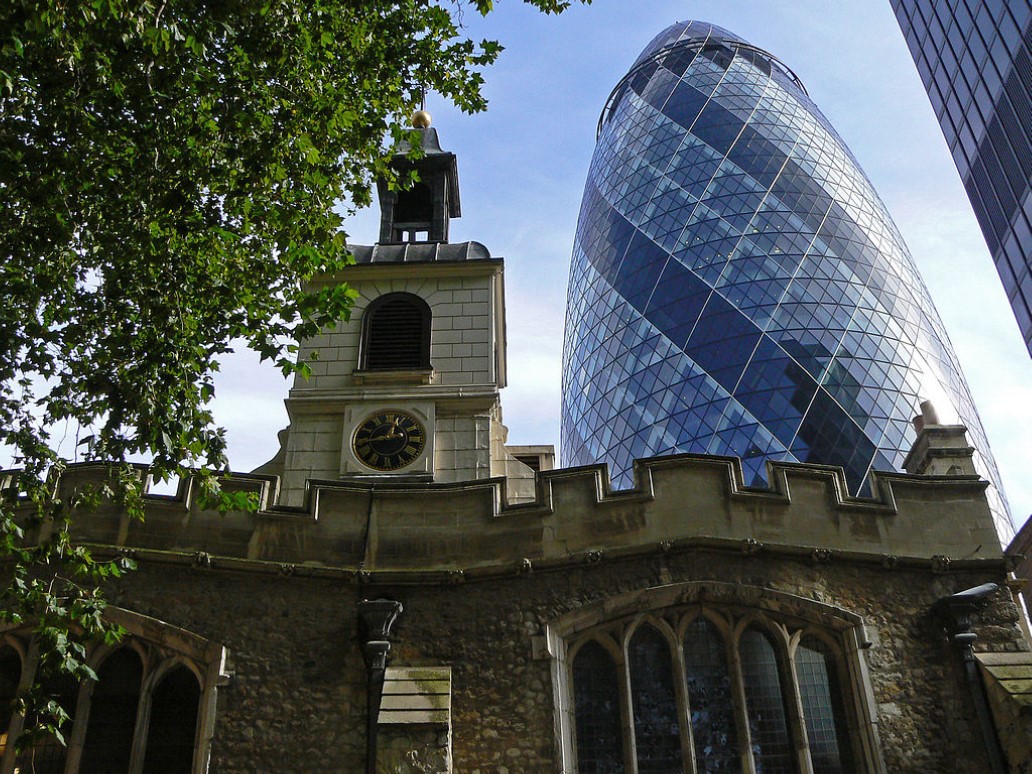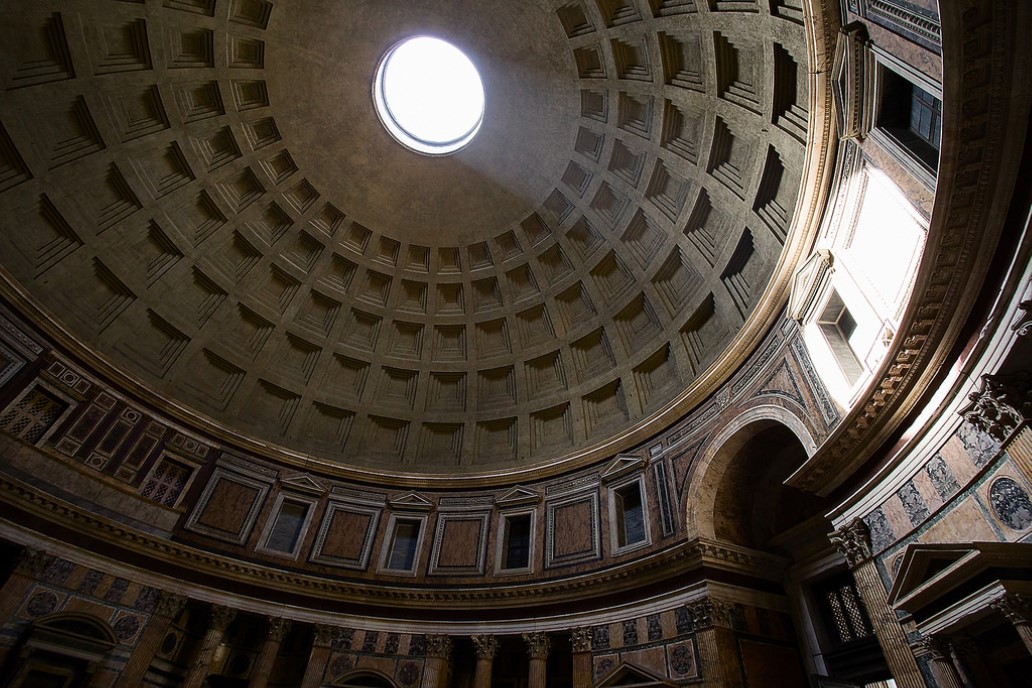The Church in Nation-States
Empire In Its New Mode
Photograph: The Church of St. Helen's, Bishopsgate in the shadow of "The Gherkin," which houses corporate offices in London's financial district. Photo credit: Roger Vander Steen | Public Domain, Wikimedia. The church building dates from the 12th century, which began with the London Council of Churches abolishing slavery in 1102 AD. It serves an evangelical Anglican congregation. In 1608, Sir Alberico Gentili, founder of the study of international law, was buried there. Its location at the heart of the former British Empire and center of financial capitalism - which is dependent on the rule of law of nation-states - exemplifies the challenge of being a faithful Christian community in the midst of modern nation-states.
Introduction
The selection of perspectives on church history in this section — Church and Empire — has been guided by three factors: (1) to demonstrate that Christianity has not been a “white man’s religion”; (2) the study of empire as a recurring motif in Scripture by recent biblical studies scholars; and (3) explorations of biblical Christian ethics on issues of power and polity, to understand how Christians were faithful to Christ or not. Christian relational ethics continues a Christian theological anthropology that began with reflection on the human nature of Jesus, and the human experience of biblical Israel. The issues in this section overlap with those raised in the section on Politics, International Relations: Global Issues.
This section explores the experience and activities of Christians navigating the Nation-State. In Nation-States, one coalition of peoples and interests tends to dominate other people groups. Christians need to be aware of this pattern, and in many cases, counteract it, especially when Christians demographically are part of the ruling coalition.
Messages and Resources on the Church in Nation-States
Politics and God’s Restorative Justice
Links to a section of our website with created and curated resources on Christian relational ethics and how they would be expressed, primarily in the context of the United States.
The Myth of Christian Ignorance
Links to our page curating concise resources on Christian attitudes prior to the Enlightenment towards scientific and philosophical knowledge, learning, medicine, arts, peace and war, politics and justice, economics and indebtedness, slavery, and human dignity. The “Enlightenment” was portrayed as “light” after the “darkness” of Christian influence in Western Europe. But this is a self-congratulatory myth.
Reflection on the Presidential Election of 2016
An reflection written on November 30, 2016, which voiced a concern about how white American evangelicals are turning towards Vladimir Putin and the Russian Orthodox Church as a model of a state-church partnership, in order to politically oppose Muslims and pro-gay voices. This continues to unfold. "The Fellowship Foundation" aka "The Family" in Washington DC and the National Prayer Breakfast being a way to work around the State Department.
White American Evangelical Political Attitudes and Behavior: Explanation and Correctives
White American evangelical political attitudes can be characterized by the debate between John Winthrop and Roger Williams, and their respective attitudes towards Native Americans, slavery, fairness, and faith in the civic space. This is a presentation also explores Scripture and church history to argue that Roger Williams was correct. Given to the staff of Emmanuel Gospel Center, Apr 18, 2018, as a follow-up to how Christian restorative justice impacts ministry; audio file here
Why Question Atheism from a Political and Moral Perspective?
A presentation on how the Enlightenment tradition gave birth to racist liberal democracies on the one hand, and Marxist communism/state-capitalism on the other. The Enlightenment tried to dethrone Christian faith from political theory and the Christian church from political power. Thus, the ideology of the individual and the nation-state went to these two extremes, colored by the presumption of cultural, intellectual, and spiritual superiority that Europeans had about themselves. Protestant heresies, fed by self-imposed Protestant ignorance about the church prior to Luther, and combined with a growing nationalism, accelerated the problem. Race became the badge of membership in Empire or the token of citizenship in the Nation-State. Authentic Christianity, therefore, must stress Pentecost (a principled cultural diversity) as the expression of Jesus' new humanity for all humanity.
Human Dignity: Does Every Individual Matter?
Science, philosophy, existentialism, other religions, and double-predestination based theologies mean that some human beings do not matter. Only a fully Trinitarian theology with a medical substitutionary atonement can provide an adequate foundation.
God as the Foundation of Human Rights
Text of a message on Genesis 1 - 11, which was aware of other Ancient Near Eastern and Mediterranean creation stories, and argued against them, as shown by the literary analysis of these literatures. Topics of disagreement include: the value of every human being; the relations of humans and God/gods; the reason for catastrophes like the Flood; the resolution or movement.
The Kingdom You No Longer Want
Text and slides of a message on Luke 13:17 - 21, given at Neighborhood Church of Dorchester, Aug 13, 2017 after the Charlottesville, VA white supremacist violence on August 12, 2017.
Race: Can Faith Help? - Has Christian Multiculturalism Failed?
Text of a message on 1 Corinthians 9:19 - 22, which was given as message 1 at a retreat for Boston College Asian Christian Fellowship in January, 2011.
Race: Can Faith Help? - Learning to See Oppression
Text of a message that introduced the interpersonal vs. systemic and by design vs. by default distinctions to help us understand racial injustice and its ongoing legacy. This was given as message 2 at a retreat for Boston College Asian Christian Fellowship, in January, 2011.
Race: Can Faith Help? - Racism, Wealth, and Power
Text of a message given on Zaccheus in Luke 19:1 - 10 as a Jew “wanting to be Roman,” with my experience as a Japanese-American “wanting to be white” at different points in my life, Asian Americans wanting to “be white” in the U.S., and Boston College wanting to “be white” among historically WASP Ivy League universities. This message highlights how “race” and “whiteness” has always been centered but not strictly bounded, for the purpose of protecting wealth and belonging. This was given as message 3 at a retreat for Boston College Asian Christian Fellowship, in January, 2011.
Race: Can Faith Help? - Jesus' One New Humanity
Text of a message on Ephesians 2:14 - 16 that highlights the horizontal, human implications of Jesus carrying “the hostility” to death and rising as a new humanity. This was given as message 4 at a retreat for Boston College Asian Christian Fellowship, in January, 2011.
Why Did God Choose a "Chosen People"? Why Not Just Skip Right to Jesus?
Links to a page on our website addressing important questions when considering the question of race, because we have to explain why God needed to work with biblical Israel as a “chosen people” in the first place, to protect and defend them at times, and to purify them at other times. Due to how this history is easily misappropriated, we have to examine not only why these interpretations of the Bible are wrong, but also why they happened in the first place.
-
Carlton J.H. Hayes, Nationalism: A Religion. Routledge | Amazon page, 1960, 2016, 2017.
Benedict Anderson, Imagined Communities: Reflections on the Origin and Spread of Nationalism. Verso Press | Amazon page, 1983, 1991, 2006.
Charles Taylor, A Secular Age. Harvard University Press | Amazon page, 2007.
Patrick J. Buchanan, Obama's World: Utopian Myth? The American Conservative, Nov 18, 2016. On the resurgence of nationalism, and some positives, because of the appeal that the group should protect its own.
Krishnan Kumar, Were Empires Better Than Nation-States at Managing Diversity? Zocalo Public Square, Mar 16, 2018. A thought-provoking article which makes us ask the question of whether Nation-States are necessarily an improvement over Empires, and why Pentecost-expressions of political pluralism might have been more possibly in formal Empires rather than formal Nation-States.
Sarah Paine, The Basis of Western Power. Dwarkesh Patel, Aug 13, 2025. Military historian, specialist in Russia and China, Sarah Paine reads the 20th century with the assertion that Western industrialization and military power are intrinsically connected to Western culture.
Christians Challenging Nation-States:
-
Andrew Harding, Central African Republic Crisis: The Church Sheltering Muslims. BBC News, Feb 13, 2014.
Ed Stetzer, An Interview with Philip Jenkins, Distinguished Professor of History, on Global Christianity. Christianity Today, Mar 21, 2014.
Tim Townsend, Forgiving the Unforgivable in Rwanda. CNN, Apr 13, 2014. See also Pieter Hugo and Susan Dominus, Portraits of Reconciliation: 20 Years After the Rwandan Genocide. New York Times Magazine, Apr 6, 2014. See also Kari Costanza, Rwanda: 20 Years Later. WorldVision Magazine, 2014.
Adriaan Vlok. Wikipedia article. Vlok was a leader of South Africa’s Apartheid State Security Council, which planned and implemented drastic repressive measures, including hit squads, carrying out bombings and assassination of anti-apartheid activists. Notable is his conversion to Christ: “In mid-2006, Vlok came forward with public apologies for a number of acts that he had not disclosed to the TRC, and for which he could therefore be prosecuted. In a dramatic gesture, he washed the feet of Frank Chikane who, as secretary-general of the South African Council of Churches, had been targeted by Vlok for assassination. Subsequently, he washed the feet of the ten widows and mothers of the "Mamelodi 10", a group of anti-apartheid activists who had been lured to their death by a police informant. He said he had become a born again Christian prior to his public apologies for his actions as Minister of Law and Order and cites this as the cause of his change of heart about his role in apartheid and his need to seek forgiveness. On 17 August 2007, the High Court in Pretoria handed him a suspended ten-year sentence for his role in the 1989 plot to kill Frank Chikane.” See also Trevor Nthola, A Practical Theological Perspective on Reconciling Relationships in a Post-Apartheid South Africa. Dissertation, University of Pretoria, 2021. “In this study, I will reflect on the place of reconciliation in the political and contemporary life of Adriaan Vlok - the former apartheid Minister of Law and Order. In terms of epistemology and methodology, this thesis will use the post-foundational and narrative approaches. I will argue that in his life, first as an advocate of apartheid, then as a repentant Christian who asked for forgiveness from some of his victims, also as one who appeared before the Truth and Reconciliation Commission (TRC) and disclosed as much as humanly possible, and later as an ordinary South African who tried to give back to the communities that were disadvantaged by the apartheid regime he was part of, he, Vlok, was a personification of post-apartheid reconciliation. This is in the sense that he, from the Apartheid’s Nats high echelons were the only one to acknowledge and accept his own political criminality as far as Apartheid is concerned.”
-
Race: Origins, Effects, Repair contains resources focused on the United States context on issues of race, with focus areas including slavery, housing, education, employment, politics, health disparities, etc.
Religious Pluralism contains resources focused on how a principled religious pluralism is the true inheritance of Christian faith.
-
Christopher Marsh and Daniel Payne, Religiosity, Tolerance, and Respect for Human Rights in the Orthodox World. Academia.edu, 2009.
Olga Lossky, Toward the Endless Day: The Life of Elisabeth Behr-Sigel. University of Notre Dame Press | Amazon page, Mar 15, 2010. About one of the most important Orthodox theologians in the 20th century.
Pravoslavie, Monks from the Kiev-Caves Lavra Stand Between Police and Demonstrators in Kiev. Pravoslavie Orthodox Christianity blog, Jan 11, 2014.
Timothy C. Morgan, China Frees Gao Zhisheng: Top 10 Lawyer Now Country's Persecuted Conscience. Christianity Today, Aug 7, 2014.
Jack Jenkins, Why Christians Are Helping Lead Hong Kong's Pro-Democracy Movement. Think Progress, Oct 12, 2014.
Matthew Bell, Christians Take a Prominent Role in Hong Kong Protests. PRI, Oct 12, 2014.
Ian Johnson, China’s Unstoppable Lawyers: An Interview with Teng Biao. New York Review of Books, Oct 19, 2014.
Michael Bordeaux, Father Gleb Yakunin Obituary. The Guardian, Dec 30, 2014. An Eastern Orthodox example of human rights activism.
Melanie Kirkpatrick, Chen Guangcheng, the Voice of China's Voiceless The 'Blind Lawyer' Recounts His Fight Against Communism's Corruptions. Christianity Today, Mar 20, 2015.
Matthew Namee, Ecumenical Patriarch Opposes Slavery in 1862. Orthodox History, Apr 27, 2015.
Mansur Mirovalev, Russia’s Communist Party turns to the Orthodox Church. Aljazeera, Dec 12, 2016. “After decades of militant atheism, Russian Communists turn to religious establishment to gain supporters.”
Nicholas E. Denysenko, The Orthodox Church in Ukraine. Northern Illinois University Press | Amazon page, 2018. Denysenko takes up Ukraine as a case study examination involving the challenge of plural national identities; important given Paul Goble, Stalin Starved Populations to Death to Russify Ukraine, North Caucasus and Kazakhstan, Statistics Show. Euromaidan Press, Nov 27, 2016.
Max Seddon, Putin and the Patriarchs. Financial Times, Aug 21, 2019. A long but worthwhile read.
Victor Gaetan, Pope Francis’ Holy Diplomacy in Ukraine. Foreign Affairs, Sep 5, 2019. “Why Washington and the Vatican Don’t See Eye to Eye”; draws attention to four principles Pope Francis expressed in Evangelii Gaudium.
Anne Applebaum, The False Romance of Russia. The Atlantic, Dec 12, 2019. “American conservatives who find themselves identifying with Putin’s regime refuse to see the country for what it actually is.” This is an excellent and much-needed article. See also Marc Bennetts, Why Orthodox Christians Are Losing Faith in Putin. Politico, Dec 24, 2019. “Priests and churchgoers are standing up to the government”
Peter Zeihan, The Russian Reach: Christian Ultranationalism. Zeihan on Geopolitics, Mar 20, 2025. Very important topic. There are connections between the Russian Orthodox nationalism and White American Evangelical-Catholic nationalism, including via the “National Prayer Breakfast.”
The Economist, Why Christianity Is Taking an Asian Turn. The Economist, Apr 16, 2025. See archived copy.
-
The Church and the Shoah: The Church For and Against Nazism resources documenting the role of Christians who resisted and supported Nazism and the tragedy of the mass murder of the Jewish population.
Leuenberg, Human Dignity is Unassailable, Inalienable, and Indivisible. Leuenberg blog, 2008. This is a response to the Russian Orthodox Church's 2008 statement on human rights
John Dickson, Indigenous Rights Before Their Time. Centre for Public Christianity, Mar 20, 2008.
Greg Clarke, Racism, Equality, Peace, and Christianity. Centre for Public Christianity video, Apr 15, 2008.
Bronwen Hanna, Rescue and Resistance on the Plateau. Centre for Public Christianity, May 27, 2008.
John Dickson, Melba Maggay on Faith, Justice, and Culture. Centre for Public Christianity, Sep 11, 2008.
Greg Clarke, Caroline Cox on Modern Slavery. Centre for Public Christianity, Apr 28, 2009.
Christopher Marsh and Daniel Payne, Religiosity, Tolerance, and Respect for Human Rights in the Orthodox World. Academia.edu, 2009.
David Molyneaux, The Role of the Church in the Fall of the Berlin Wall. Traven Maven blog, Aug 28, 2009.
David Bentley Hart, Revolutionary Christianity and Its Alternatives. Public Christianity, Mar 3, 2010. A 31 minute video.
Simon Smart, Life and Faith: William Cooper and the Battle for Land Justice in New South Wales. Centre for Public Christianity, Sep 15, 2013.
Hanna Kozlowska, Pope Warns Churches to Take In Refugees - Or Else. Quartz, Sep 16, 2015.
Melody Wachsmuth, The Refugee Crisis Frontline: Croatia’s Christians Lend a Hand. Christianity Today, Sep 22, 2015.
The Guardian, Jane Addams: The Activist Who Set the Foundation for Modern Social Work. The Guardian, Oct 24, 2017. and Jane Addams (Wikipedia article)
Scott McConnell, The Immigrants Challenging Europe’s Code of Silence on Islam. The American Conservative, Jan 11, 2019. "They have been liberated by their ethnic backgrounds to speak more candidly than the vast majority of their countrymen"
Vanessa Gera, Polish Nationalists Protest U.S. Over Holocaust Claims. Associated Press, May 11, 2019.
Gauthier Vaillant and Élodie Maurot, What Can Christianity Do For Europe? LaCroix International, May 18, 2019. A helpful history of Christian influence in Europe as rooted in respect for the human person.
Joshua McNall, The Church as Echo of the Press. Jochua McNall blog, May 29, 2019. C.S. Lewis disagreed with a morning prayer written at the start of WW2, “Prosper, O Lord, our righteous cause.” Lewis wrote to his brother, Warnie: “I ventured to protest against the audacity of informing God that our cause was righteous—a point on which He may have His own view.”
Roger Cohen, Greece Is the Good News Story in Europe. New York Times, Jul 8, 2019. “Greek resilience through crisis demonstrates that reports of democracy’s demise are exaggerated.”
Susan Neiman, There Are No Nostalgic Nazi Memorials. The Atlantic, Sep 14, 2019. “Americans could learn from how drastically German society has moved away from the nadir of its history.” Important because remembrance is an ethical act, and because post-WW2 Germany named Christian faith in its Constitution and had significant Christian leadership
David Sims, A World War II Biopic That Raises Pressing Modern Questions. The Atlantic, Dec 14, 2019. “Terrence Malick’s A Hidden Life tells the story of an Austrian farmer’s defiance in the face of a regime that contradicted his deepest beliefs.”
Sprouts, Bonhoeffer‘s Theory of Stupidity. Sprouts, Oct 15, 2021. This video features nationalist and ethno-fascist jingoism.
Elizabeth Prodromou, Diplomacy, Geopolitics, and Global Orthodox Christianity in the Twenty-First Century. Berkley Center | Georgetown University, Nov 20, 2023. Prodromou “analyzes the historical significance and current presence of Orthodox Churches in locations of key competition between the North Atlantic Treaty Organization and Russia, and in the great power rivalries of the twenty-first century. This raises important questions about the role and impact of Orthodox Churches in contemporary geopolitics. This policy brief illustrates how Kremlin-supported challenges by the Moscow Patriarchate to the Ecumenical Patriarchate of Constantinople, the global leader of a unified Orthodox Church that endorses universal human rights and rule of law, have provoked intense ecclesiastical conflicts within Orthodoxy over institutional, normative, and material resources.”
Katja Hoyer, Christianity’s Imprint Remains in a Secularizing Europe. The Dispatch Faith, Dec 15, 2024.
“In Europe, we may not go to church in the same numbers, but we still feel culturally embedded in the Christian tradition. Nowhere is this contrast more stark than in my home region. I have lived in the United Kingdom for several years now, but I was born in socialist East Germany, where four decades of atheist policies created what has sometimes been referred to as “the most godless place on earth.” The state collapsed with German reunification in 1990, but secularization continued. According to a study conducted by the University of Chicago, eastern Germany took a unique path in becoming and staying the only majority atheist society on earth.
I was only 5 years old when the state I was born into disappeared, but both before and after the fall of the Berlin Wall, I grew up in a world entirely devoid of religion. The first church service I remember attending was in the early 2000s when a friend’s sister married a (former) West German and the ceremony was held in his home church in a small town just north of Frankfurt. I still remember how strange it all seemed to me, the communal singing, the prayers, and the music.
Yet, even in East Germany, we were so steeped in cultural Christianity that the socialist dictatorship had to acknowledge its importance. The 500-year anniversary of Martin Luther’s birth, for instance, was marked with an entire “Luther Year” in 1983. Wartburg Castle, where he translated the New Testament into German, was restored at great expense in a state that permanently lacked building materials.
State leader Erich Honecker, an atheist originating from the Catholic Saarland state in West Germany, personally headed the “Luther Committee” that organized the festivities. Despite the atheist ideals he held up for his East German subjects, he expressed his hope that, to many of them, “a visit to the Wartburg will mean a strengthening of their feeling for their nation and for their homeland.””
-
The Church Under the State of Israel resources exploring the struggle of Palestinian Christians in the State of Israel. The Zionist interpretation of the State of Israel is itself a version of the ethno-state vision of the Enlightenment. Zionism is supported uncritically by many white American evangelicals because of poor exegesis of Scripture, guilt over American anti-Semitism, and syncretism with the ethno-nation-state of Enlightenment rationality.
Princeton University, Christianity in the Near East: Past, Present, and Future? Arab Orthodoxy blog, May 15, 2015. See especially Samir Khalil Samir, The Role of Christians Within the Arab-Islamic Society of the Middle East
Emma Green, The Impossible Future of Christians in the Middle East. The Atlantic, May 23, 2019. “An ancient faith is disappearing from the lands in which it first took root. At stake is not just a religious community, but the fate of pluralism in the region." The Trump administration has tried to support Christians in Iraq, but given US involvement in the region, such support is a mixed blessing.
-
Paul Freston, Protestant Political Parties. Routledge | Amazon page, 2004. An impressive global survey of how Protestants have expressed Christian faith (or not) in the political sphere.
Daniel McCarthy, Why Liberalism Means Empire. The American Conservative, Jul 16, 2014. This article is about classical and secular liberalism, one wing of the Enlightenment, which challenges traditions and cultures without providing a substantive spiritual frame of reference to replace it; shows how Enlightenment liberalism is a thin parody of Christian missionary activity
Adam Serwer, The Nationalist's Delusion. The Atlantic, Nov 20, 2017. A helpful, historically broad analysis of how racism manifests in politics.
Christians Capitulating to Nation-States:
-
Johan Tredoux, Apartheid at 9pm. Uncommon Community, May 15, 2019. Highlights the role of the Dutch Reformed Church and the Dutch Afrikaaners resisting slave abolition by the British Empire, another Christian effort.
Timothy Isaiah Cho, How Learning About Abraham Kuyper’s Influence on Apartheid Changed Me. Medium, Dec 20, 2018. Dutch Reformed theologian Kuyper believed that Africans were inferior to Europeans, on the grounds of the “curse of Ham” theory; Kuyper also was averse to racial intermarriage.
-
The Church in White America: The Supremacists resources related to why American white supremacy is a specifically Protestant heresy and problem
Race: Jesus’ New Humanity as Response resources focused on the United States context on issues of race, with focus areas including slavery, housing, education, employment, politics, health disparities, etc.
Religious Pluralism curated resources focused on how a principled religious pluralism is the true inheritance of Christian faith.
Authoritarianism: Augustine’s Authoritarian-Theocratic Synthesis curated resources on how Augustine of Hippo formally justified the use of the state by the church to persecute heretics.
Tribalism: The Chosen People-Racist Synthesis curated resources on how Gentile Christian supercessionism distanced Gentile Christians from the diaspora Jewish community and therefore adopted a triumphalist political posture.
Libertarianism: The Protestant-Individualist Synthesis curated resources on how Protestants accept the individualism of the Enlightenment in economic matters, primarily.
Secular Liberalism curated resources on how Protestants and others accept the individualism of the Enlightenment in relational and cultural matters, primarily.
-
David Bentley Hart, Tolstoy and Dostoyevsky and Christ. First Things, Sep 14, 2009. Hart mentions Dostoyevsky's belief in Russian blood and soil, an Eastern Christian crusade to retake Constantinople, and anti-Semitism as a semi-pagan belief.
Admin, Ecumenical Patriarch Criticizes Nationalist Tendencies Within Eastern Orthodoxy. Pravmir, Apr 30, 2014.
Christian Science Monitor Editorial Board, One Moscow Voice for Healing in Ukraine. Christian Science Monitor, May 4, 2014.
Rod Dreher, Church to Orthodox Fascists: Repent! The American Conservative, May 5, 2014.
Sergei Chapnin, A Church of Empire: Why the Russian Church Chose to Bless Empire. First Things, Nov 2015. See also Nicolai N. Petro, Russia's Orthodox Soft Power. Carnegie Council, Mar 23, 2015.
Pravoslavie, Has Post-Soviet Russia Really Morphed Into a Bulwark of Christian Morality? Pravoslavie, Apr 28, 2015. See also Ryan P. Hunter, Analyzing the Transformation of Church-State Relations in Russia from 1987 to 2008 (blog, Dec 1, 2015.
Katherine Kelaidis, Why is the Church Silent About LGBT+ Violence in Russia? Public Orthodoxy, Jan 9, 2017. This question should also be asked in the U.S. and other Christian-influenced nation-states.
Stephen Turley, The Reawakening of Christian Civilization in Eastern Europe. The Imaginative Conservative, Jan 23, 2017. Interesting factually, although I am concerned that it is not thorough ethically and politically.
Dmitry Adamsky, Russian Nuclear Orthodoxy: Religion, Politics, and Strategy. Stanford University Press | Amazon page, 2019. Adamsky “considers how, since the Soviet collapse in 1991, the Church has worked its way into the nuclear forces, the most significant wing of one of the world's most powerful military organizations. Dmitry Adamsky describes how the Orthodox faith has merged with Russian national identity as the Church continues to expand its influence on foreign and domestic politics. The Church both legitimizes and influences Moscow's assertive national security strategy in the twenty-first century.”
Anne Applebaum, The False Romance of Russia. The Atlantic, Dec 12, 2019. “American conservatives who find themselves identifying with Putin’s regime refuse to see the country for what it actually is.” This is an excellent and much-needed article. See also Marc Bennetts, Why Orthodox Christians Are Losing Faith in Putin. Politico, Dec 24, 2019. “Priests and churchgoers are standing up to the government”
Aris Roussinos, The Irresistible Rise of the Civilization-State. UnHerd, Aug 6, 2020. Roussinos gives a fascinating thesis of Russia as a successor state to Byzantium, an unreconciled hybrid of East and West. Roussinos does not comment on the churches in the nations he mentions, but the implications are fairly clear: churches will naturally express the traditional, conservative forms of cultures and civilizations.
Pavel Kuzenkov, “The Third Rome”: From Eschatology to Political Myth. The Russian Orthodox Church, Apr 4, 2021.
Sergei Khudiev, The Dechristianization of the West: How and Why It is Happening. The Russian Orthodox Church, Nov 19, 2021. Khudiev’s argument, that LGBTQ rights are at the heart of a totalitarian ideology with global pretensions, is in my opinion sensationalist, fear-mongering, and incorrect. It is a return of political pluralism. Some people no doubt want it to be culturally monolithic. But those two things are not the same thing. This is an example of how anti-LGBT attitudes are deployed in Russian Orthodox circles to build Russian suspicion and hostility against the West.
Cyril Hovorun, Russia’s “Scramble for Africa” and Its Church. Orthodox Christian Studies Center, Fordham University, Feb 1, 2022. “Most observers agree with the explanations provided by the Russian church, that the reason for retaliation is the recognition of the Ukrainian church. I believe this is not a reason but an excuse. The reason could be seen in the larger picture of Russia’s advances to the African continent. Following China’s success in what can be perceived as the recolonization of Africa, Russia rushed for the chance to get a share in what it sees as a second Scramble of Africa. It seems that the Eastern authoritarian regimes are trying to fill the void on the continent left by the Western democracies.”
Kristaps Andrejsons, Russia and Ukraine Are Trapped in Medieval Myths. Foreign Policy, Feb 6, 2022.
Diana Butler Bass, Next Year in Kyiv. The Cottage | Substack, Feb 23, 2022. Bass shows how there is a church narrative intertwined in the conflict between Russia and Ukraine. “The conflict in Ukraine is all about religion and what kind of Orthodoxy will shape Eastern Europe and other Orthodox communities around the world (especially in Africa). Religion. This is a crusade, recapturing the Holy Land of Russian Orthodoxy, and defeating the westernized (and decadent) heretics who do not bend the knee to Moscow’s spiritual authority.”
Deutsche Welle, War in Ukraine: What's Driving Putin? Deutsche Welle, Feb 26, 2022. Putin’s intellectual position is the pre-1917 Russian position. Putin wants to unite the Slavic nations: Russia, Belarus, and Ukraine. He believes Lenin made a mistake by recognizing them as different nations. From a Christian ethics perspective, one concern with this is the manipulation of Slavic Orthodox identity.
George E. Demacopoulos, The Orthodox Response to Putin’s Invasion. Commonweal, Feb 27, 2022. Ranges from complacency to clear condemnation.
Orthodox Church Study Center, A Declaration on the “Russian World” (Russkii Mir) Teaching. Public Orthodoxy, March 13, 2022. This OCSC statement is a rich statement on Scripture, the Orthodox ethic and witness, and the problem with the Russian Orthodox Church’s “Russian World” teaching. It condemns ethno-phyletism, the principle of the ethnic organization of the church, in favor of a multi-ethnic and cosmopolitan vision from Pentecost. The list of signatories is impressive.
Deutsche Welle, “Russia Uses Religious Sentiments to Support Political Crusades" Religion in the Russia-Ukraine War. Deutsche Welle, March 15, 2022. This 5.5 minute video spotlights Moscow Patriarch Kirill, who supports the Russian invasion of Ukraine, speaking of gay pride parades and Western culture as evil forces. Other Orthodox Churches criticize Kirill and the ROC.
David Ignatius, Russia’s Assault on Ukraine Is Entwined With a Religious War. Washington Post, May 5, 2022. “Moscow’s push for control in recent years has taken on aspects of a religious Cold War. The Russian and Eastern Orthodox prelates have battled for dominion over churches in Africa, Korea, Singapore and elsewhere. Kirill created an “exarchate” in Africa to replace the patriarch of Alexandria, who is loyal to the Eastern Church. An article in Religion News Service described it as an effort to “woo priests and parishioners … weakening the ancient institution and expanding the Russian Church’s sway.” [...] “Russia has never attacked anyone,” Kirill said in a sermon on Tuesday, according to Orthodox Times. He spoke on a day when shells and rockets were bombarding the birthplace of Russian Orthodoxy.”
Mansur Mirovalev, Is Ukraine’s Largest Church Still Pro-Russian? Al Jazeera, Dec 24, 2024. “In 2019, Ukraine’s pro-Western government established the new Orthodox Church of Ukraine (OCU) that reports to the Patriarchate of Constantinople. However, despite cajoling, coercion and persecution of clerics, the formerly pro-Russian UOC remains Ukraine’s largest religious see. It officially broke away from Moscow and helped the war effort by hosting refugees and collecting humanitarian aid and donations for drones and medical supplies. But many of its leaders have been under fire for their real or alleged pro-Moscow sympathies.”
-
Tribalism: The Chosen People-Racist Synthesis curated resources on how Gentile Christian supercessionism distanced Gentile Christians from the diaspora Jewish community and therefore adopted a triumphalist political posture.
The Church and the Shoah: The Church For and Against Nazism curated resources on WWII and the Christian complicity with German fascism. For example, Gregory Paul, The Great Scandal: Christianity’s Role in the Rise of the Nazis. Church and State, Oct 11, 2003. Paul traces the Christian alliance with the Roman Empire into anti-semitism and the rise of German Aryan "Volkism" and the German equivalent of "manifest destiny" through the conquest of Lebensraum ("living space").
Libertarianism: The Protestant-Individualist Synthesis curated resources on how Protestants accept the individualism of the Enlightenment in economic matters, primarily.
Secular Liberalism curated resources on how Protestants and others accept the individualism of the Enlightenment in relational and cultural matters, primarily.
R. Kendall Soulen, The God of Israel and Christian Theology. Fortress Press | Amazon page, 1996. A very important work exploring how early Christian apologetics and theology did not fully articulate the original New Testament anchoring of Jesus in his Jewish context and the thought forms of Hebrew biblical narrative. This resulted in a political situation under European Christendom which left the Jewish community vulnerable. The section on Kant and Schleiermacher as representatives of Christian Modernism which sought a "universal" grounding without reference to Judaism is especially relevant.
David Bentley Hart, The Violence of Christian History. Aragon123ist, Apr 8, 2011. A 7 minute video.
John C. Rao, The Luther and His Progeny: 500 Years of Protestantism & Its Consequences for Church, State, and Society. Angelico Press | Amazon page, 2017. A collection of mainly Catholic authors critiquing the effects of the Protestant Reformation.
Bill Bigelow, The Real Irish-American History Not Taught in Schools. Common Dreams, Mar 16, 2019. The Anglican Church did not challenge the English imposition of the Irish potato famine.
Nick Robins-Early, Nationalist Governments Are Trying To Rewrite Holocaust History — By Targeting Museums. Huffington Post, Mar 8, 2020. Poland’s “Law and Justice” party is the major institutional actor, and it is a Christian right-wing populist party.
Tom Holland, The End of Secularism is Nigh. UnHerd, Aug 12, 2020. Holland raises the question of what form of Christianity will rise to meet the challenges of Islamic, Hindu, Buddhist nation-states.
Benjamin Novak, Hungary Transfers 11 Universities to Foundations Led by Orban Allies. New York Times, Apr 27, 2021. “The transfer, accompanied by billions of euros in state assets, will enable the prime minister and his supporters to exert long-term influence.” Universities have always been centers of intellectual questioning and political resistance; this is a sign of fascism.
Ian Garner, Russia’s Frighteningly Fascist Youth. Foreign Policy, May 21, 2023. A new generation of Russians glorifies war, death, and Vladimir Putin.
-
Yoram Hazony, The Virtue of Nationalism. Basic Books | Amazon page, Sep 4, 2018. Hazony praises the heretical appropriation of the Old Testament national freedom motif by the English, Dutch, and Americans, without acknowledging how those empires violated biblical ethics from Mosaic Israel (which included welcoming of foreigners, fairly egalitarian distribution of land, restorative justice, and empowerment of women) from Jesus' mission (anti-territorialism, expansion of communal identity, principled multi-culturalism) and ethics of repentance (restitution in both Moses and Jesus) which would normally be applied to colonialist injustice. See review by Friedrich Hansen, Reflections on the Renaissance of Nationalism. Geopolitica, Sep 4, 2018. From a Russian-Eurasian geopolitical posture, which many Eastern Europeans support, and regular support for Hazony from The American Conservative.
Peter Beinart, Debunking the Myth that Anti-Zionism is Antisemitic. The Guardian, Mar 7, 2019. "All over the world, it is an alarming time to be Jewish – but conflating anti-Zionism with Jew-hatred is a tragic mistake"
Church and Empire: Topics:
This page is part of our section on Church and Empire. These resources begin with a biblical exposition of Empire in Church and Empire and the meaning of Pentecost in Pentecost as Paradigm for Christianity and Cultures, then grouped by region: Middle East, Asia, Africa, Europe, Americas, then Nation-State, with special attention given to The Shoah of Nazi Germany.

